- Home
- Neil Plakcy
Honest to Dog
Honest to Dog Read online
Table of Contents
Honest to Dog (Golden Retriever Mysteries, #7)
1 – Falling Apart
2 – Old Classmate
3 – Fine Tuning
4 – Cocktail Hour
5 – Most Likely To
6 – Protected Information
7 – Party Time
8 – Innocent and Trusting
9 – Unofficial Inquiries
10 – Lady Gaga
11 – Floater
12 – Financial Records
13 – Open Source Tools
14 – Cat and Mouse
15 – Investment Advice
16 – Kids Code
17 – Skid Marks
18 – Hazard Zone
19 – What Ricky Likes
20 – Easy Lies
21 – Phone Llama
22 – The Grace of God
23 – Making a Splash
24 – Ethan’s Confession
25 – The Wheels of the World
26 – Cuckoo
27 – Child Minder
28 – Balancing Act
29 – Crossing Commons
30 – Troublemakers
31 – Crossroads
32 – Temptations
33 – Hardy Boys Forever
34 – Connections
Dog is in the Details | 1 – Handsome Boy
Sign up for Neil Plakcy's Mailing List
Also By Neil Plakcy
About the Author
Honest to Dog
a golden retriever mystery
by Neil S. Plakcy
Reviews for the Golden Retriever Mysteries:
Mr. Plakcy did a terrific job in this cozy mystery. He had a smooth writing style that kept the story flowing evenly. The dialogue and descriptions were right on target.
—Red Adept
Steve and Rochester become quite a team and Neil Plakcy is the kind of writer that I want to tell me this story. It's a fun read which will keep you turning pages very quickly.
Amos Lassen – Amazon top 100 reviewer
We who love our dogs know that they are wiser than we are, and Plakcy captures that feeling perfectly with the relationship between Steve and Rochester.
—Christine Kling, author of Circle of Bones
In Dog We Trust is a very well-crafted mystery that kept me guessing up until Steve figured out where things were going.—E-book addict reviews
Copyright 2017 Neil S. Plakcy
This book is a work of fiction. Names, characters, places, and incidents either are products of the author’s imagination or are used fictitiously. Any resemblance to actual events or locales or persons, living or dead, is entirely coincidental. All rights reserved, including the right of reproduction in whole or in part in any form.
1 – Falling Apart
“I am totally screwed.” I ended my phone call and put the cell down on the kitchen table, then leaned my head down to my chest. My golden retriever, Rochester, rose from his place by the sliding glass doors and came over to me, resting his head in my lap.
Lili walked into the kitchen and sat beside me. “What’s the matter, Steve?”
I reached down to stroke Rochester’s golden head, then looked up. “That was Professor Finkle’s wife. He’s in the hospital with a perforated bowel, and he won’t be able to lead the personal finance seminar for me this weekend.”
“He’s in more trouble than you are,” Lili said. “A perforated bowel is serious.”
“I know, and I feel bad for the guy. I’ll even send him flowers. But now I’m going to have to cancel the grand opening and first seminar at Friar Lake.”
Fred Finkle, who taught introduction to business at Eastern, was to give a weekend session on personal finance and investing as the opening program at Eastern College’s Friar Lake Conference and Executive Education Center, where I was the director. I had been working my butt off for the past eight months to develop and advertise programs and prepare for the launch. And all I’d put together was going to fall apart because of Professor Finkle’s perforated bowel.
“Can you find someone else to run the program?” Lili asked. “There must be other faculty in the business department.” Lili was a professor of visual art and chair of the fine arts department at Eastern, and sometimes I looked at her, her auburn curls cascading around her heart-shaped face, so beautiful and smart and funny, and marveled that she was willing to love me.
“Not with Finkle’s expertise,” I said. “And his wife said he’s knocked out from all the drugs, so he’s too sick to suggest anyone from outside who could help.”
Eastern was a liberal arts college, and its strengths were in the humanities and the sciences. The business department was a small one, offering only basic courses. No one else on the faculty had Finkle’s expertise.
Could I run the seminar myself, working from Finkle’s notes?
That was a resounding no. I’d taught English at Eastern as an adjunct, and I was decent at it because I loved the way words could be used, and I was able to convey that enthusiasm to students, to help them correct their grammar and clear up their muddy thinking. But the world of finance was completely foreign to me.
Maybe it was the word “foreign,” but I remembered my old friend Tor, a Swedish-born investment banker in New York. We’d been friends since our grad school days at Columbia, when he was in the business school and I was getting my MA in English.
“I’m going to call Tor,” I said to Lili.
“Excellent idea. I’m going to up to relax. Call me if you need me.”
As she walked upstairs, Rochester sprawled at my feet, and I dialed Tor’s number.
He answered right away. “Hello, Steve. I was just thinking about you. My children are obsessed with having a dog since they have heard so much about the amazing Rochester. Perhaps we will come out to the country one weekend soon.”
“That would be fun. Not this coming weekend, though, because my first program at Friar Lake is supposed to start.”
“Not good for us either,” Tor said. “I leave tomorrow morning for a conference in Chicago where I am to give a speech.”
“Crap,” I said. “I was hoping you could help me out with the program.” I explained my bind. “I don’t suppose you know someone who could jump in, do you?”
“Let me think for a moment.”
There was silence on Tor’s end as I contemplated the disaster ahead of me. My programming would go down in flames, I’d be fired and have to go back to cobbling together a living from part-time teaching.
“There is one man I know,” Tor said. “He worked here for a while but left us to move to your town, where his ex-wife and children live. His name is Douglas.”
I wrote that down. “First or last name?”
“First. Last name Guilfoyle. I will spell it for you while I look in my contacts for his information.”
I wrote the name down and something about it seemed familiar, but I couldn’t place him. “Here it is,” Tor said. “I will email you his information.”
“You don’t have a personal number for him, do you?” I asked, looking at the clock. It was after six on a Wednesday evening, so doubtful the guy would be at work.
“Personal cell. Here it is.” He read it out to me.
I thanked him profusely and hung up. Why did I know Douglas Guilfoyle’s name? Had I met him through Tor at some point in the past? Though I trusted Tor, I Googled Guilfoyle and I found his information on LinkedIn. He had an MBA from Michigan, and had spent nearly twenty years in public finance, the arm of an investment bank that handles issuing bonds for governments, including a short stint at Tor’s firm. In January he had joined a firm called Beauceron Capital Partners in Stewart’s Crossing.
I checked out the
company’s home page, which featured an impressive looking black dog with tan paws, one of the European shepherd breeds. The caption beneath the picture read “The Beauceron is an ancient herding dog native to France. It is faithful and obedient, with a tireless work ethic. We at Beauceron Capital Partners work hard and faithfully for our clients.”
After skimming through employee bios and the company’s investment philosophy, I was convinced it was legitimate. I dialed the number Tor had given me, and when Guilfoyle answered, I introduced myself as a friend of Tor’s.
Before I could get any farther, he said, “I’m sorry, but I’m just about to take my kids and dog out, so I can’t talk now.”
“You’re in Stewart’s Crossing, right? Where do you walk your dog?”
“The Delaware Canal, behind the Drunken Hessian restaurant.”
“Would it be all right if I brought my dog out there and we walked together? I really need to talk to somebody very quickly. I’d appreciate it.”
“Sure. My kids already think I ignore them, so what could it hurt? We’ll be there in about fifteen minutes.”
He hung up before I could get any details, but I figured that a man, kids and a dog at the canal ought to be recognizable.
I looked out at the courtyard of my townhouse. Daffodils Lili had planted were beginning to bloom, and what was left of the sun was nearly as yellow as the flowers. Even if Doug Guilfoyle couldn’t help me, a nice walk with Rochester could clear my head.
I called upstairs and told Lili I was going to take Rochester to the canal for a walk. At the magic word, my happy golden began dancing around the kitchen like a manic kangaroo. He was almost three years old, but in many ways he was just a big puppy, thought he was almost ninety pounds of fur, tongue and muscle.
He was a rescue dog originally adopted by my next door neighbor. After she was killed, he came to live with me, and gave my life a sense of purpose when I needed one.
Once upon a time, I was married and living in Silicon Valley, working as a technical writer and developing my computer skills while my wife and I tried to start a family. After her first miscarriage, she indulged in retail therapy that put us in a financial hole for the next year. When she miscarried a second time, I hacked into the three major credit bureaus and put a red flag on her credit cards so she couldn’t bankrupt us again.
That stunt got me a year in a California prison and a two-year probation, which had ended recently. It also dealt the final blow to my marriage and sent me back home to Bucks County without a full-time job, family or close friends nearby.
After years spent in a childless, loveless marriage, I had forgotten what it was like to care for someone else—and to receive affection in return. Once I adopted Rochester, I had to get up every day and feed and walk him. I had to make sure he had shelter and toys and the comfort that came from being part of a pack. More than anything else, it was Rochester’s unconditional love that had brought me back to the world of the living.
I grabbed his leash and loaded him into my ancient BMW for the ride down to the park which ran along the Delaware Canal, through the center of Stewart’s Crossing, my home town. Barges had once brought coal down from upstate Pennsylvania to the port at Bristol, but when rail replaced mule barges, the canal had been abandoned. In the 1960s, the county had converted the towpath beside the canal to a linear park. It was a great place to let Rochester off his leash to run off excess energy.
I parked and we walked down to the towpath. A big, sodden log floated in front of us, and Rochester got down on his front paws and barked at it. “Don’t worry, puppy, it’s just a log. I was afraid he might try and jump into the water, which was deep and fast-moving after recent rains, so I tugged him down the path.
With the log behind us, I let Rochester off his leash and tossed a Frisbee for him. The towpath was paved with reddish gravel, and the new grass along the canal bank was a bright green. Daisies and lilacs bloomed on the verge, beneath a thicket of trees that sheltered us from the back yards of houses. Though we were in the middle of town, it was like we’d pushed the real world away, and that was just what I needed.
Rochester galloped down the bank after the Frisbee, but when he caught it instead of returning it to me, he settled down for a chew. I often called him my golden thiever, because once he grabbed something it was his. I strolled down to where he rested on the grass and sat down beside him, one hand ruffling his golden fur.
The sun was setting, casting bright glints and long shadows on the water. As I looked up and down the towpath for Douglas Guilfoyle, my thoughts went back to the upcoming program at Friar Lake. It would be a nightmare to contact everyone who had signed up and refund their money. What if someone had made flight arrangements? Would we be expected to reimburse them for their airfare? How could anyone trust Friar Lake – or me—if the very first program was cancelled?
2 – Old Classmate
A female Yorkie with a pink bow in her topknot came trotting toward us from around a slight bend in the canal, and Rochester popped up. I went on alert; I don’t like it when dogs show up on their own. She seemed friendly enough, going down on her front paws in the classic play position, and Rochester nosed her. Then they began to run around in circles.
From the distance, a chorus of voices called, “Pixie! Pixie!”
The dog heard her name, and took off in the opposite direction. Rochester followed her for a few feet, but she darted into the underbrush and he stopped. He barked once, but when the little girl dog didn’t respond he came back to me.
I looked down the canal bank and saw a heavyset man of about my age approaching with two kids – a boy of about sixteen, a girl a few years younger. “You shouldn’t have let her off the leash, Ethan,” the man said.
“She always comes when I call her,” the boy said. “It’s just because you’re here. She doesn’t like you anymore.” He was rail-thin with straight, dark blond hair that fell over his forehead and a typical teenage slouch. If I were his father, I’d make him wear a belt to keep his jeans up on his slim hips instead of sliding down to show off the waistband of his briefs.
“You’re mean, Ethan,” the girl said. She looked like her father, with round cheeks and baby fat and the same curly dark hair. She wore a tight pink polo shirt and khaki slacks that were so new they still had the packaging creases.
Rochester popped up as the boy answered, “Shut up, Madison.”
“Both of you focus,” the father said. “We have to find Pixie.”
I stood up as Rochester rushed down the bank in the direction the little dog had been headed. “Is Pixie a Yorkie with a pink bow?”
“She is,” the man said. “Has she been past here?”
“Yup. She ran into the azaleas over there.” I pointed to where Rochester was nosing at a hedge of pink flowers coming into bloom. He barked once and then sat on his haunches.
I held out my hand. “I’m Steve, and that’s Rochester.”
“Doug,” he said, though I’d already guessed who he was.
Doug, the two kids and I hurried down the bank to where Rochester sat. Through the new leaves I could see the little Yorkie’s pink bow. “Looks like she got stuck in there,” I said.
I peeled back the bushes and the dad peered in. “Yeah, she got into some kind of corner, but it doesn’t look like she’s caught on anything.”
Pixie started yapping, and Rochester yawned and sprawled on the ground beside me.
“She doesn’t do reverse,” Ethan said.
“I know that, Ethan,” Doug said. “Your mother and I only split up a year ago. I haven’t forgotten anything about either of you, or Pixie.”
I pried the bushes aside so Doug could reach in for the little dog. Once he had her in his arms, she began to squirm and wiggle. Madison hooked the leash to her collar and her father put the dog on the ground. Pixie tried to run away, twisting the girl’s arm.
“Give her to me,” Ethan demanded. When his sister complied, he jerked hard on the leash and the dog
yelped.
I don’t like to see anybody mishandle a dog, but I wasn’t going to jump into this family dynamic.
“Don’t hurt her,” Madison said.
“Pixie, heel!” Ethan said, and the little dog obeyed. “We’re going to walk her, Dad.”
He and his sister took off down the canal bank. “Be careful,” Doug said. “Don’t get too close to the water.” He shook his head. “If they fall in I can’t even jump in to save them. Can’t swim, and I have a morbid fear of water from back when I was a kid.”
Rochester slumped back down on the bank beside me. “So, you’re Tor’s friend Steve. When I told him I was moving down here he mentioned you.” Doug took off his glasses and rubbed the bridge of his nose, and something about that gesture reminded me of how I knew him.
“Dougie!” I said. “Steve Levitan. From Eastern. Freshman year, we both lived in Birthday House.” The rumor goes that the money for that dormitory was donated by a very wealthy alumnus named Hoare. The college demurred at naming a dorm Hoare House, so the man made his donation on his birthday.
“Jesus, nobody’s called me Dougie in years,” he said. “Wow. We haven’t seen each other for a donkey’s age. How do you know Tor Svenson?”
We talked for a couple of minutes about the past. Doug hadn’t aged well – I didn’t remember him being so heavy, and there was more gray in his hair than in mine.
“Remember the night we all got arrested?” I asked.
One spring night just before final exams, Dougie and I were playing a drinking game in the student lounge with a bunch of buddies. By the end of the game, we were all smashed. Dougie suggested we should race around the outdoor fitness course around the perimeter of the lawn — naked.
Hey, it seemed like a good idea at the time.
About a dozen of us stripped down in the lobby and left our clothes in a big, sloppy pile, then took off outside. We were halfway through when the cops arrived. I guess we’d woken up some of the nerds in the dorm who thought sleep was important for success at final exams.
“I remember,” Doug said. “We did some crazy shit back then.” He looked down the bank and saw his kids playing with their dog. “You stayed in the area all this time?”

 Three More Dogs in a Row
Three More Dogs in a Row Beach Bums
Beach Bums Sexy Sailors
Sexy Sailors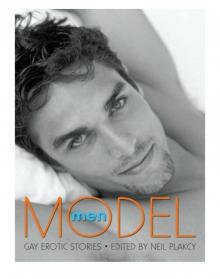 Model Men
Model Men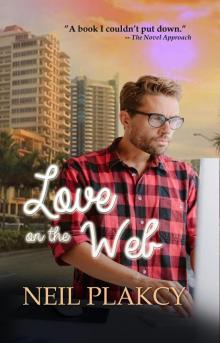 Love on the Web
Love on the Web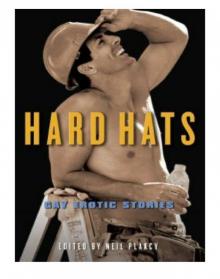 Hard Hats
Hard Hats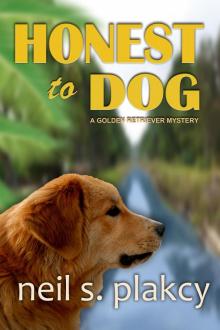 Honest to Dog
Honest to Dog Skater Boys
Skater Boys Beach Bums_Gay Erotic Fiction
Beach Bums_Gay Erotic Fiction Love on Stage
Love on Stage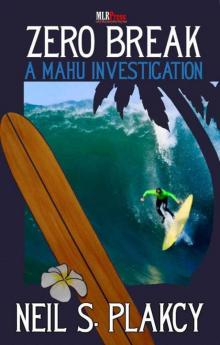 Zero Break
Zero Break Rhiannon
Rhiannon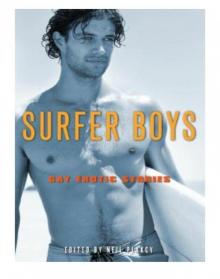 Surfer Boys
Surfer Boys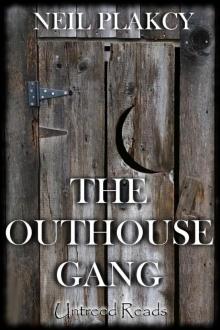 The Outhouse Gang
The Outhouse Gang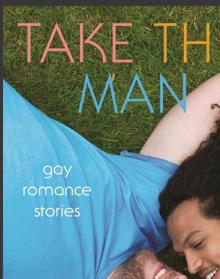 Take This Man
Take This Man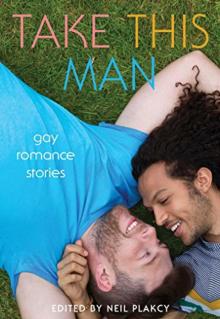 Take This Man_Gay Romance Stories
Take This Man_Gay Romance Stories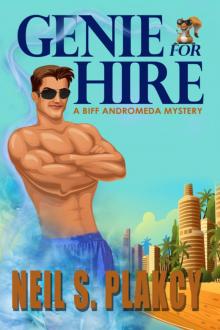 Genie for Hire
Genie for Hire